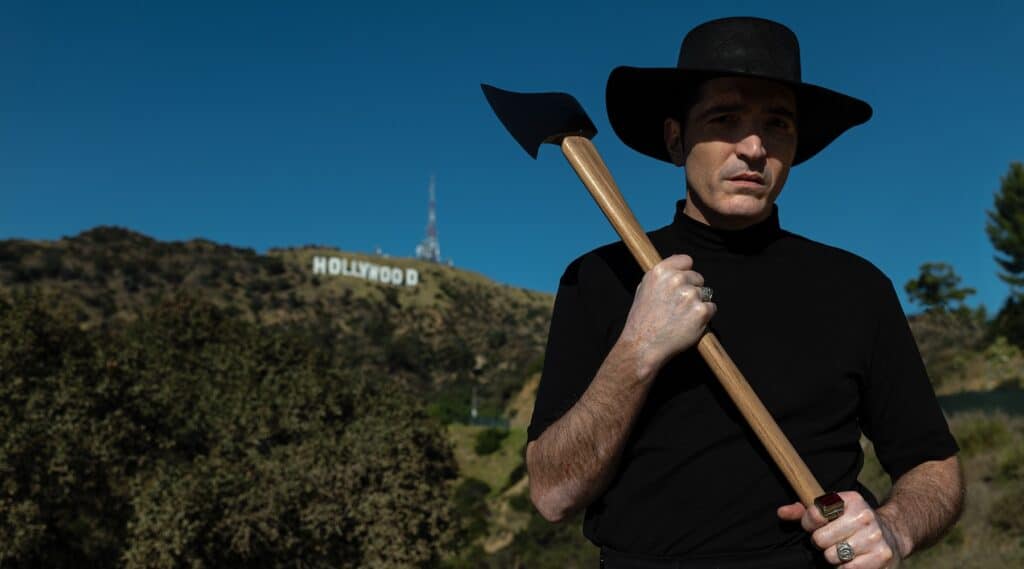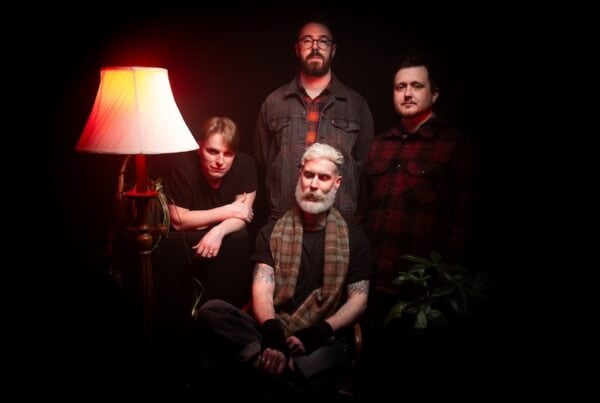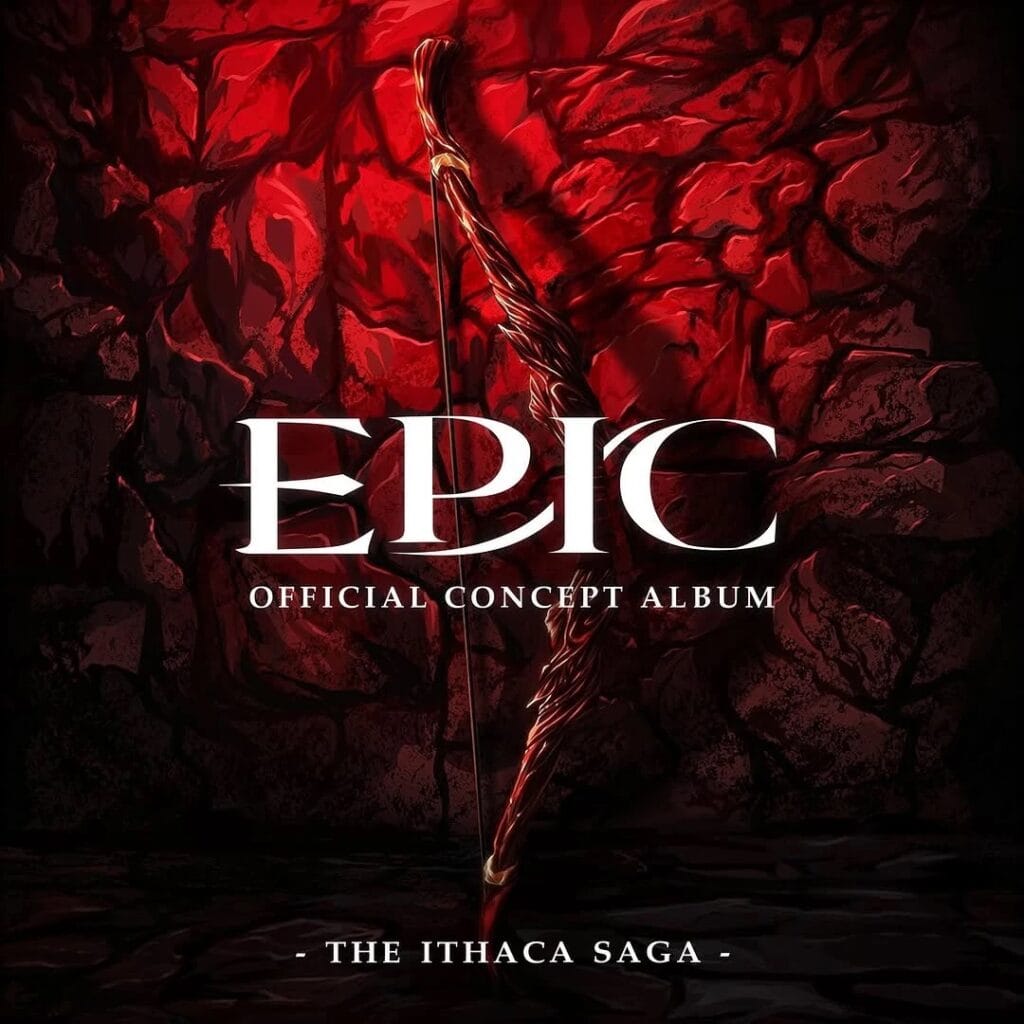The word ‘success’ is an undefinable mystery, as the word changes definition depending on who you are speaking with and what point of life they are in. However, few could look at the career of David Dastmalchian and think that he has not been successful, as the films he has starred in are staples in the cinematic history of many people’s viewing lives. David is an inspiring man with an admirable dedication to his work and craft. Any piece of work with his name on it is worth looking into. From the anxious chaos of his turn as Thomas Schiff in The Dark Knight, or the heroic comedy of Polka-Dot Man in Suicide Squad, and the creative intensity he brings to roles like Piter de Vries in Dune, or Jack Delroy in Late Night With The Devil. It is hard to imagine someone of his distinction ever struggled with something as common as addiction, but everyone has their own story of dark times, and David shares his with Soundsphere, and how alternative music helped him through it.

Photo credit: J. Konrad Schmidt
David explores his definitions of success as a performer…
The character that Dastmalchian plays in Late Night with the Devil is Jack Delroy, the host of late-night talk show Night Owls. In the movie, Dastmalchian’s character’s show is on the verge of cancellation, and he airs a supernatural Halloween episode about the occult to save it from going down. This says a lot about the character’s passion for his work and dangerous dedication to succeeding whatever the consequences. Dastmalchian meanwhile, has this to say in terms of his own, real-life dealings with success:
“The word ‘success’ is one of the trickiest words in the language. It is so potent, and it’s a prism of all these different meanings to us. It is a beautiful word, it is a dangerous word, it is a painful word, it is a rewarding word. One of the things I learned early on is that ‘success’ was very important to me, but the way I defined ‘success’ was going to continue to evolve throughout the course of my life.”
David Dastmalchian battled a heroin addiction in his early adulthood, which he eventually overcame and has been sober ever since. He struggled with the addiction for five years, and he has been vocal about this experience and supportive of those going through similar times.
“Back in 2002, ‘success’ meant living one day without the benefit of heroin. A few months after that, ‘success’ meant being able to get out of bed, go to a job, get to a meeting, and get home safely. Many years after that, five years after I really started to get into the tenure of my sobriety if you will, I looked at ‘success’ as being the opportunity to do the art that I loved and get paid to do it. Eventually again, that ‘success’ shifted from not only getting paid to do it but being able to make a living off of it.”
Today, with where David is in terms of his career, he claims ‘success’ to him is gauged on the people he surrounds himself with. As well as being someone he can depend on. “Success for me is being able to surround myself and work with people who are exceptional at their work and their craft. Who elevate story, who are kind people, who I would be grateful to spend time with, whether we were making a movie or not. And ultimately, to learn to depend upon myself for my safety, my security. To be able to count on myself, to be there for myself when I need myself the most. That’s it, that’s a huge thing that I’m striving for on this very day, and I will work every day until I get there.”
His taste in music, from Nine Inch Nails to Failure via Spiritualised…
Throughout his life, music influentially impacted Dastmalchian, and he drew from music during the challenges he faced. “Music is life to me. Music is an enigma to me, and it is something that I am drawn to like moths to the flame,” he said. “I was, y’know, 12-13, deeply depressed and anxious young man who got his hands on the cassette tape of Violator [by Depeche Mode]. I started listening to that album to the point that the tape got run thin. And Pretty Hate Machine [by Nine Inch Nails] a year after that, when I think I was like a freshman in high school and I just I went into this exploratory period of my life where goth, industrial, rock all became the soundscape and the score of my life.”
Dastmalchian says that Nine Inch Nails specifically, was a band that carried him through his using years and has stayed with him all these decades later. “There are those handful of artists and music styles that whether it was in my really deep struggles with suicidal attempts and ideation, through my addiction years, all the way to where I am now as a clean, sober dad of two… there’s these certain artists that live with those chapters, and that’s beautiful, and wonderful, but there’s certain artists that carried through.
“Bands like Failure,” he went on to mention, “[a] hugely important band for me back in the 90s. I saw Failure opening for Tool, who is yet another one of the bands who has carried me through decades now. I mean, I bought Undertow in high school, but when I went to do the Dark Knight, I was in London, and this was before like streaming. Or, if people were, I wasn’t hip to, like, Napster so I didn’t know how to get music other than physical media. So, I found a record store in London so I could buy a copy of Undertow and listen to it on headphones while I was in my trailer preparing to go on set for Dark Knight.
Nine Inch Nails, for sure, and a whole bunch of other bands kind of have made it through all of the generations. Spiritualized is another that were a big part of my using years, but now as a clean person that music is still influential and important for me.”
Listen to David’s favourite albums from our chat…
Words of Advice for creatives and musicians…
Before the conversation with Dastmalchian comes to an end, he shares something about his screenplay Animals, and words of advice for those who read this article.
“This is for anyone who is reading this, thinking about where and when and how we follow our heart. I wrote a film called Animals, which is a fictional story about two people who are intensely dysfunctional as well as being heroin addicts. It was very inspired by a lot of my own experience. There is a scene in the film where the guy shoplifts a bunch of CDs, and he sells most of them to get drug money, but he keeps the one tape that’s Fantastic Planet to give to the girl he loves. When we were making the film, I had to reach out to the band, through a friend of mine whose brother plays with the band. I had to reach out to them to see if they’d give me permission, and I have now had the incredible honour of not only collaborating with the band Failure but they’re very dear friends of mine. Goes to say that if you’re reading this, and you’re going “I don’t know if I should take that leap, if I should reach out to them. Should I try to get my demo to that person? Should I try and get my song played for that person?” You gotta give it your shot.”
This friendship with Failure led to a spot in their music video Dark Speed from the EP In the Future, the fifth Failure album.
Read Soundsphere’s review of Late Night with the Devil below, you can see the film in select UK cinemas now…
Interview: Dom Smith | Words: Oceane Adams






